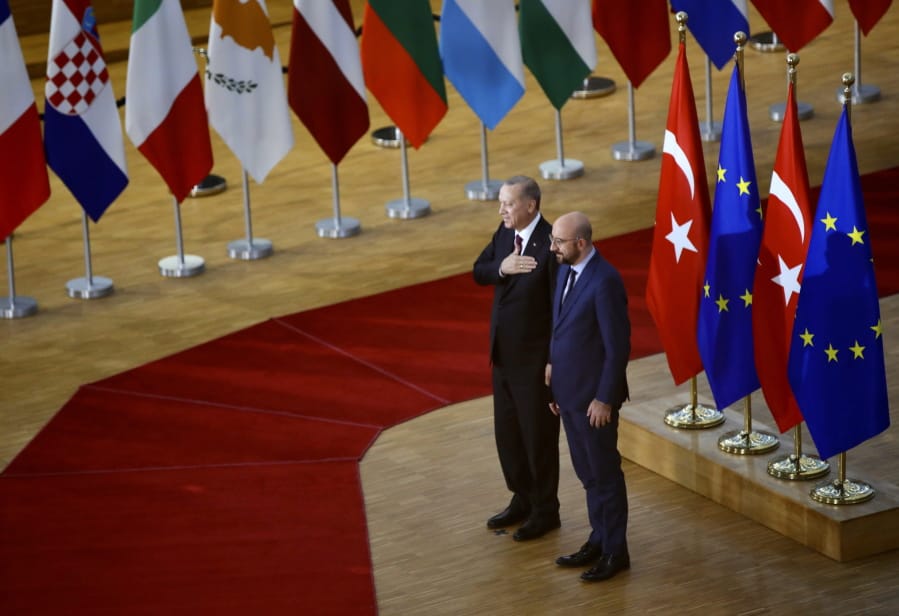ANKARA, Turkey (AP) — The European Union should stop “stringing Turkey along” over helping out with the millions of migrants on its territory, the country’s foreign minister said Tuesday, a day after the two sides agreed to review a 4-year-old deal aimed at stemming refugee flows to Europe.
Turkish Foreign Minister Mevlut Cavusoglu said the EU must take “sincere” steps to help Turkey manage the flow of migrants, including finding ways to ensure Syrian refugees can return home.
The minister spoke a day after President Recep Tayyip Erdogan held a meeting with top EU officials in Brussels, with both sides agreeing to review their 2016 deal on migrants.
The meeting was called after thousands of migrants massed on Turkey’s border with Greece, following the Turkish government’s decision to open its borders to migrants wanting to illegally enter Europe.
To prevent the crossings, Athens deployed riot police and border guards who in many cases used tear gas, flash grenades and water cannons. Greece says that its forces were in turn tear-gassed by Turkish forces on the other side of the border.
Erdogan has demanded that Europe shoulder more of the burden of caring for Syrian refugees in Turkey — thought to exceed 3.5 million. Turkey is accusing the EU of not meeting its obligations under the 2016 agreement, including failing to pay money promised to Turkey to stem the flow of migrants to Europe.
The EU insists it is disbursing the funds, and accused Erdogan of “blackmail” for waving migrants through to Europe.
Following the talks in Brussels late Monday, European Council President Charles Michel said teams headed by Cavusoglu and EU foreign policy chief, Josep Borell, would work “in the next days to clarify the implementation of the deal between Turkey and the EU to be certain that we are on the same page.”
“We are ready for a constructive study … We expect sincerity from the EU. The era of stringing Turkey along is over,” Cavusoglu told state-run Anadolu Agency.
Cavusoglu said the sides would work toward “updating” the Turkey-EU deal in line with recent developments, including the situation in Syria’s northwestern Idlib province, where a Syrian government offensive has driven thousands of Syrians toward the border with Turkey.
The 2016 agreement isn’t “about the EU giving money to Turkey to keep the refugees,” Cavusoglu said. “It comprises several issues from visa-free travel to ensuring the voluntary return of refugees.”
The minister said the sides would try to draft a “road map” in time for a EU summit on March 26.
The Greek side of the border along the Evros River, known as the Maritsa in Turkey, was generally quiet Tuesday and authorities were using the lull to reinforce barriers to prevent crossing attempts.
Teams were reinforcing around 40 areas of the border with barbed wire, including along parts of the banks of the Evros River, known as the Maritsa in Turkish, which runs along most of the frontier between the two countries.
Charis Thocharides, head of the village of Pythio, said residents were worried that the wave of migrants that used to cross from Turkey to Greek islands would now start crossing through their region of the land border.
“It’s a bit of a psychological issue,” he said, adding that villagers could hear the disturbances coming from the border at night when Greek authorities were trying to push back migrants attempting to cross. “They used to feel safe and now suddenly they’ve started to think of various things.”
Greek authorities said they had made only one arrest on the Evros border Tuesday, and thwarted 473 attempts at illegal entry. Since Feb. 29, 346 people have been arrested and more than 43,000 attempted crossings prevented.
Austrian Chancellor Sebastian Kurz on Tuesday thanked Greece for “doing everything to protect the European external borders.”
“There is an attack here on the part of Turkey,” Kurz said after talks in Vienna with Greek Prime Minister Kyriakos Mitsotakis. “Turkish President Erdogan is abusing refugees, is abusing migrants, is abusing people who have been living in Turkey for years, is exploiting their suffering and using them as a weapon against the European Union. He is trying to blackmail Europe with these tactics and force Europe to its knees.”
Mitsotakis said the crisis must be defused as soon as possible, noting, however, signs of improvement on Greece’s eastern islands where there have been no migrant arrivals in recent days.
“I must say that today I am more optimistic than in recent days that a compromise can be found which will be mutually beneficial for the European Union and for Turkey,” Mitsotakis said.
Erdogan, meanwhile, told a group of journalists on his return to Turkey that he is set to meet with French President Emmanuel Macron and German Chancellor Angela Merkel in Istanbul on March 17, state-run Anadolu Agency reported. British Prime Minister Boris Johnson may also attend.
Under the 2016 agreement, the EU offered Turkey up to 6 billion euros ($6.7 billion) in aid for the Syrian refugees it hosts, fast-tracked EU membership and other incentives to stop Europe-bound migrants. The number arriving in Greece from Turkey dropped dramatically after the deal took effect.
Associated Press writer Costas Kantouris in Pythio, Greece, Geir Moulson in Berlin, and Nicholas Paphitis in Athens, Greece, contributed to this report.



